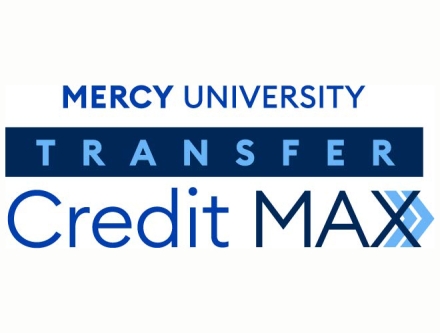
Transfer Credit Evaluation
Mercy University maximizes the unique set of credits you’ve earned to get you to your next degree faster and in the most financially sound way.
Mercy Makes Transferring Credits Easy
Our dedicated Transfer Team will facilitate your transition to Mercy University while maximizing the transfer of credits from your prior academic experience. We will show you exactly how your transfer credits apply to your intended major and a PACT Mentor will assist in mapping out a semester by semester plan through graduation.
Credit evaluations are completed at the time of application based on all college transcripts received by the Office of Admissions. Preliminary, unofficial credit evaluations may be obtained by prospective transfer students.
All final official transcripts for courses taken prior to attending Mercy must be submitted within the first semester. For detailed transfer policies please see the Undergraduate Catalog.

We make sure every credit transfers
We know how important it is to have your credits transfer over and be applied toward your specific program. We’ve created Transfer Credit Max so you can get a customized idea at how we can apply your credits and help you to see how quickly you can finish your degree at Mercy.
Once you are accepted, the Transfer Team in our Student Services Support Center (SSSC) will carefully evaluate your college transcripts, test scores and other documents for equivalent transfer credits.
Testing and Additional Credits
Testing, ACE and Life Achievement credits may be considered towards a degree program. These credits will be included in the maximum 90 credit transfer limit and credit will not be granted for any duplicate course. Official transcripts are required to consider credit for transfer. Up to 30 open elective credits may be granted for prior learning achievements or work experiences, which the University judges to be of such quality as to be comparable to educational achievement at the university level. Any student interested in applying for live achievement credit should consult their COP or PACT Mentor. If you are considering taking any of these exams please consult your PACT Mentor prior to doing so. PACT Mentors can also assist with Advanced Placement and International Baccalaureate credit evaluation.
Advanced Placement is a program created by the College Board which offers college-level curriculum and examinations to high school students. Credit is only granted for scores of 3, 4, or 5. Reach out to your PACT Mentor to see if you can receive credit for the AP exams you've taken.
https://www.collegeboard.org/
CLEP is a group of standardized tests that assess college-level knowledge in several subject areas. A minimum score of 50 is required for consideration.
DSST are credit-by-examination tests originated by the United States Department of Defense's Defense Activity for Non-Traditional Education Support (DANTES) program. The program is an extensive series of examinations in college subject areas that are comparable to the final or end-of-course examinations in undergraduate college courses. There is variation in the minimal acceptable scores.
http://getcollegecredit.com/
The IB program is an intense curriculum for high school juniors and seniors, with an emphasis on intercultural understanding and enrichment. It culminates in six rigorous subject exams. Similar to taking AP courses and exams, participating in an IB program shows that students seek academic challenges. To be awarded credits students must complete the course with a score of 4, 5, 6, or 7. Reach out to your PACT Mentor to see if you can receive credit for the IB exams you've taken.
http://www.ibo.org/
The NYU Proficiency Exam measures a students proficiency of a foreign language through the language testing services offered at NYU-SCPS. The score is equivalent to the number of college-level credits the student will be granted.
https://www.sps.nyu.edu/professional-pathways/proficiency-testing.html
An ACE credit recommendation represents college-level equivalencies based on a review of workforce training, military training or occupations, and other sources of learning outside the college classroom, such as national exams and certifications.
http://www.acenet.edu
Portfolio assessment is a flexible, efficient way of earning college credit for the college-level knowledge that a student has acquired outside of a traditional college classroom. It is available to students whose documented life and work experiences provide evidence of knowledge equivalent to that required in a Mercy University course. Students may earn up to 30 credits through this process.
To be eligible for the Life Achievement Portfolio Assessment process, a student must have successfully completed ENGL 112 either at the University or in transfer and successfully pass LFAC 301 a 3-credit 15-week course. Through LFAC 301 a student develops and submits a portfolio showcasing their learning and the extent to which college-level learning is documented and make credit recommendations. Credit is not guaranteed; rather it is based on the learning that is documented in the portfolio and its applicability to the student's undergraduate degree program. The assessment of achievement for LFAC 301 is on a pass/fail basis. Credit for the courses petitioned in the portfolio is on awarded on a credit/no credit basis. No letter grades are assigned through the process. Credit earned through Portfolio Assessment may fulfill general education, major, major elective and open elective degree requirements. Credit cannot be earned for graduate courses in this process. If you think this may be a good fit given your live and work experience outside of college, talk to your mentor about this option.
Transfer Credit Policy
The Office of Admissions, in consultation with the appropriate academic departments, is responsible for awarding transfer credit. Your transcript will be evaluated on a course-by-course basis by a member of our Transfer Team to determine course equivalencies.
A maximum of 75 credits may be accepted upon transfer from accredited two-year college. A maximum of 90 credits may be accepted upon transfer from accredited four-year colleges. Combined transfer credits from two- and four-year colleges may not exceed 90 credits. If two and four year colleges are combined no more than 75 of these 90 credits can be from the two year schools. The 90 credits will also include any outside testing credits, ACE credits, or Life achievement. Credit is usually transferable for all courses in which the applicant has obtained a grade of "C" (2.0) or higher. Unless a student has an associate’s degree he/she will ordinarily receive full credit for all courses that have been completed successfully.
Please refer to the catalog for more detailed information.
